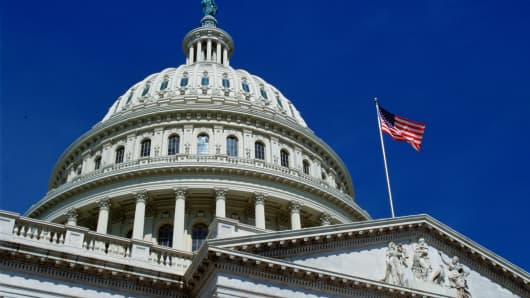The answer, according to the Treasury Department and some in Congress, is to pass legislation that makes it harder for U.S. companies to leave.
Read MoreIs patriotism a virtue in business?
Put aside for a moment, the questionable wisdom of the U.S. government punishing businesses for doing what they think is best for the long-term interests of their shareholders, customers and employees.
This type of legislation could exacerbate the very problems it purports to solve.
For starters, reports are already emerging of more U.S. companies looking abroad, as they race to consider deals ahead of any law cracking down on inversions. And if a law like this did pass, it could actually make U.S. companies more inviting targets for foreign takeovers, because a U.S. company's assets would be more valuable if held by a company in a lower-tax country.
That's not the worst of it.
By focusing its attention on forcibly keeping U.S. companies here, Washington is leaving unanswered the most critical question of all:
Why are so many U.S. companies looking at options to leave in the first place?
Critics charge that companies are merely evading their tax obligations. But taxes are almost always just one of many considerations in decisions for U.S. companies to relocate abroad, including the depth of a foreign country's capital markets, the skills of its workforce and proximity to suppliers and customers.
Still, there is no doubt that taxes are becoming a bigger concern for U.S. companies.
How could they not be?
The U.S. has the highest corporate tax rate in the Organization for Economic Cooperation and Development, even as other countries in the developed world have lowered taxes and moved to territorial tax systems. Although most U.S. multinationals don't pay the top nominal rate due to an array of credits and deductions, that's hardly a virtue. Our tax code is a complicated mess and it is part of the reason why $2.1 trillion in U.S. corporate earnings are parked abroad, instead of being put to work in America building new factories and facilities and creating jobs.
Both parties agree that our tax code is a disaster. In fact, when Treasury Secretary Jack Lew sent a letter last week to the House Ways and Means Committee requesting action on the inversion issue, he made clear that the administration's preferred solution was broad corporate tax reform "to improve the investment climate in the United States."
Read MoreJack Lew pushes Congress to crack down on tax inversions
Unfortunately, the broad bipartisan consensus that corporate tax reform needs to happen is paired with the equally bipartisan consensus that it has no chance of happening anytime soon due to the hyper-partisan rancor in D.C.
So it goes with any number of issues critical to America's economic competitiveness ranging from immigration and entitlement reform, to job creating infrastructure investments, that apparently won't be dealt with until 2015 or beyond.
There are plenty of smart and dedicated people in our government who want to tackle these issues, but they don't yet collectively have the will to act.
In the meantime, more business leaders are questioning the viability of their U.S. operations. They ask themselves: "Where can we find the most flexibility to deploy capital to invest, acquire and hire in a way that's best for our business?" Increasingly, the answer to that question is:
"Somewhere other than the United States."
Read MoreKing George III applauds Jack Lew's tax remarks
Late last year, the World Economic Forum released its annual Global Competitiveness Report, ranking countries on 12 pillars of private and public sector economic competitiveness including financial market development, higher education, and training and innovation. The U.S. moved up to 5th, after having slipped in the rankings for four straight years.
But beyond the encouraging headline, there were sobering findings on competitiveness measures where the government plays an important role, with the U.S. lagging behind other countries on quality of overall infrastructure (19th), effect of taxation on incentives to invest (40th), burden of government regulation (80th) and government budget balance (142nd).
Americans are justifiably frustrated by U.S. companies relocating overseas, and paying their taxes somewhere else. But the answer is not to prohibit them from leaving.
The answer is to give them more reason to stay.
That doesn't mean giveaways and favors. It means broad tax and regulatory reforms that enable U.S. businesses to compete on a level playing field in our global economy.
We need Washington to find a real solution.
Until they do, expect more U.S. companies to seek opportunity abroad.
Commentary by Edward J. Reilly, global CEO of the strategic communications practice at FTI Consulting. Follow FTI Consulting on Twitter @FTI_SC.
Disclosure: The views expressed in this piece are those of the author and are not necessarily the views of FTI Consulting, its management or its subsidiaries.


